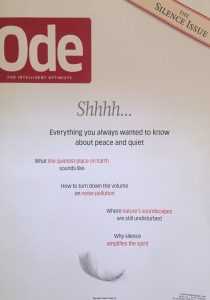From 2013 to 2023, I was deputy curator at the Nieman Foundation for Journalism at Harvard and editor of Nieman Reports, which covers thought leadership in journalism. During my tenure, Nieman Reports won, among other awards, five Mirror Awards recognizing excellence in media industry reporting and two Bart Richards Awards for Media Criticism.
Forced to Flee: How Exiled Journalists Hold the Powerful to Account
March 20, 2023
As press freedoms around the globe erode, journalists are building networks outside their home countries to continue reporting
Open-Source Journalism in a Wired World
December 7, 2022
Spurred by Russia’s invasion of Ukraine, open-source investigations are being integrated into standard newsroom practice
Political Coverage is Changing to Get Beyond ‘Us Versus Them’
September 14, 2022
A more nuanced depiction of voters and issues can help newsrooms better report on elections and political campaigns
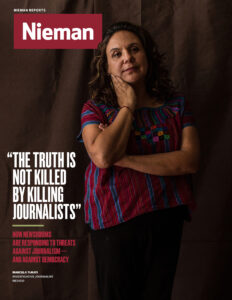
Reporting at Risk
From Kashmir to Russia to Mexico and beyond, journalism is under threat. Essays by journalists who are managing to do vital independent reporting — often at great personal risk
A “Kiss of Freedom” for Turkey’s Press
August 15, 2022
Independent journalists are stubbornly persisting in digital formats from newsletters to videos to podcasts
How Latin American Journalists Are Using Collaborations To Get Around Censorship Laws
August 3, 2022
Silence is not an option
In Ghana, Only a Handful of Journalists Are Able To Do Critical Reporting
July 19, 2022
On paper, Ghana is a thriving democracy. On the ground, journalists do not have the freedom to do their work
The Myanmar Junta’s Wanton Violence Is Forcing Journalists to Flee
July 13, 2022
Exiled reporters are finding it difficult to reach sources back home, who are increasingly afraid to talk
What It’s Like Working in the Deadliest Country in the World for Journalists
July 12, 2022
In Mexico, journalists are trapped between physical threats and political disputes
With Dom, We All Died a Little Bit
July 6, 2022
The murder of a veteran journalist covering the vulnerable in the Amazon has reverberated among reporters in Brazil
“We Should Side with Democracy:” Why the War in Ukraine is Existential for Baltic Journalists
June 30, 2022
Thirty years after the fall of the Berlin Wall, the Baltic states’ independent media reckon with Russia’s invasion of Ukraine
Tunisian Journalists Face Police Intimidation and Jail Time for Doing Our Jobs
June 29, 2022
As President Kais Saied consolidates his grip on power, Tunisia — and its media — are sliding backward from hard-won democratic gains
In the Philippines, Will Marcos Give the Media Hell Like Duterte Did?
June 23, 2022
The rise of hyper-partisan influencers has made it easier for those seeking power to control the flow of information
In Turkey, Erdoğan’s Crackdown on the Free Press Intensifies
June 22, 2022
As the country prepares for next year’s elections, the government is making it even harder for independent journalists
I witnessed Orbán crack down on Hungary’s free press. Here’s my advice to journalists facing similar threats
June 9, 2022
When you come under attack as a journalist, don’t make yourself the center of the story
Judges, Too, Can Be Enemies of the Press
June 1, 2022
In Malaysia, news organizations can find themselves on the losing end of expensive lawsuits
Piercing Putin’s Truth Blockade
May 27, 2022
A handful of courageous Russian journalists are fighting on the frontline of an information war. It is a battle that affects us all
In Mexico, A Mix of Violence and Economics Threatens Local News Organizations
April 26, 2022
Newspapers once had the financial strength to resist pressure from politicians looking for favorable coverage. That independence is in danger
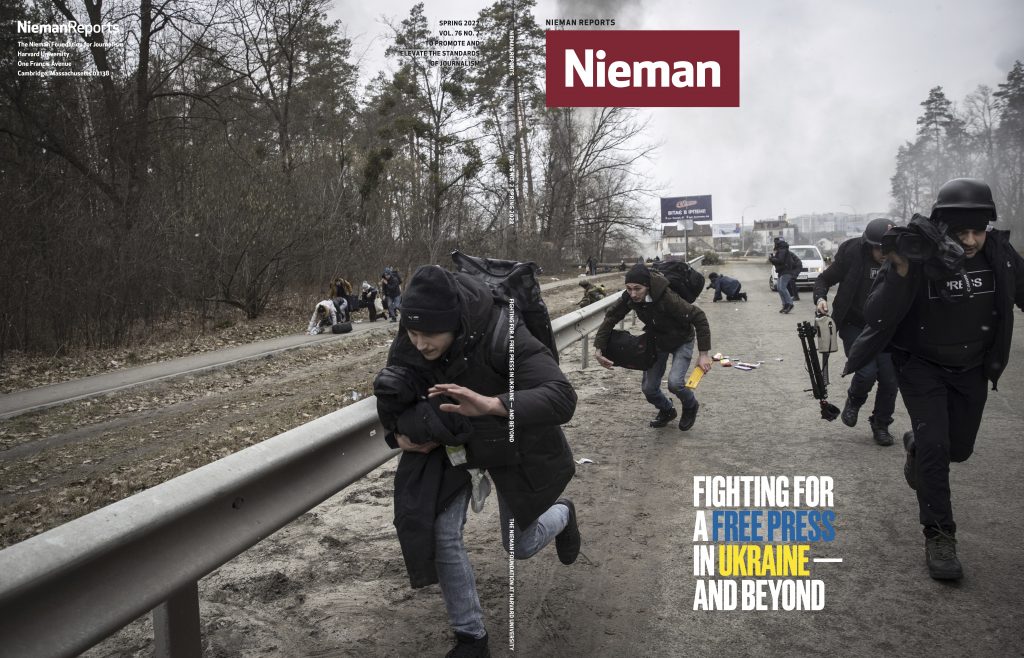
Don’t Look Away: Photojournalists Are Documenting the Brutality of Russia’s War in Ukraine
April 15, 2022
There are layers to bearing witness, from the war's victims, to journalists in the field, to readers like you
Covering The War in Ukraine: “The Putin Regime Doesn’t Want Eye Witnesses”
March 28, 2022
Prior to the invasion, few Ukrainian journalists had experience working in conflict zones. Now the war has come to their homes
Reporting in Ukraine: “This War is Unpredictable and Deadly Like No Other”
March 21, 2022
Russia’s brutally simple Ukraine strategy poses new risks for journalists
Putin Shuts Down Russia’s Free Press for Reporting Accurately on Ukraine
March 9, 2022
The crackdown on independent news outlets takes Russia back to the Soviet era
Fighting for A Free Press in Ukraine — and Beyond
March 4, 2022
As Ukrainians defend their country against the Russian invasion, journalists there and in other post-Soviet states guard their fragile press freedoms
Ukrainian Journalists Risk Everything to Stand Up to Putin
March 2, 2022
Russia’s history of suppressing independent media at home offers clues about what might happen in Ukraine
Call Out Bigotry in Reporting on the Ukraine Invasion
February 28, 2002
How journalists cover armed conflict shouldn’t hinge on the color of people’s skin or the color of their hair
The Media and the Ballot Box: Confronting 21st Century Voter Suppression
December 15, 2021
As more states restrict ballot access, news outlets must invest in consistent voting rights reporting that cuts through lies, distortion, and disinformation
In Europe, Podcasters of Color Make Their Own Space for Conversations on Race
October 21, 2021
Podcasts are popping up across the continent to fill the coverage void of race and racism in mainstream media
Lessons from the Pandemic
Summer-Fall 2021
Can — or should — journalism return to a pre-pandemic “normal?”
In India, the Last Few Bastions Of The Free Press Stand Guard Against Rising Authoritarianism
September 20, 2021
How Indian newsrooms are holding the Modi government to account
The Real Meaning of “He’s No Angel” for Journalism
July 14, 2021
Why an artist’s angelic rendering of George Floyd could help change the way journalists describe victims of police violence
Journalism in Myanmar: “An Apocalypse for The Media”
June 18, 2021
Myanmar’s former ‘outlaw’ journalists lead the battle for a free press
Alexei Navalny, Social Media, and the State of the Free Press in Russia
June 10, 2021
The space for independent Russian journalism is shrinking, but a handful of small outlets still offer an alternative to state media
Serving the Audiences Mainstream Newsrooms Don’t
May 19,2021
How the pandemic, anti-police brutality protests, and Atlanta spa shootings starkly illustrate the need for community and immigrant-serving media outlets
Covering Extremism: “As Exhausting a Beat as It Is Important”
March 30, 2021
Reporters who have long covered the far right offer advice — and warnings — for where reporting on white nationalism and conspiracy theories should go from here
In India, Journalists “Are Fighting For Whether Truth is Meaningful or Not”
February 25, 2021
Indian Prime Minister Narendra Modi is cracking down on the free press — and the free press is pushing back
Spanning Beats, Environmental Justice Reporting Influences Every Story
February 3, 2021
By connecting systemic inequities to environmental harms, environmental justice reporting covers everything from race and housing to healthcare and immigration
Spurred by Black Lives Matter, Coverage of Police Violence Is Changing
January 28, 2021
Newsrooms are moving away from privileging police accounts over those of police violence victims
What's Next...
Winter 2021
The Extremist Mob at the U.S. Capitol was America, Too
For Political Reporters, The Post-Trump Era Poses Practical—and Existential—Questions
Challenges and Possible Solutions to Winning Back Trust in Journalism Post-Trump
How Journalists Beyond the U.S. Fight Back Against Government Intimidation
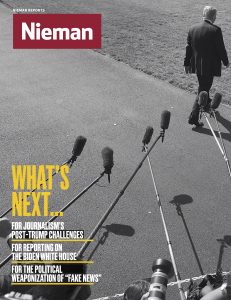
The Newsrooms We Need Now
Fall 2020
Print design and video by Dan Zedek
5 Things I Learned as an AAPI Engagement Editor Covering Anti-Asian Hate
True Newsroom Diversity Must Account for Disability Status, Too
With Fresh Start, The Boston Globe Weighs News Value of Older Articles Versus Individual Harm
To Change Its Future, The Kansas City Star Examined Its Racist Past
How Can Journalists Better Serve Immigrant Communities?
Don’t Exoticize Latino Voters; Report on Them as Americans
It’s Time to Cover Black Women as the Norm and Not the “Other”
To Move Forward on Racial Equity, Newsrooms Need to Reckon with Their Pasts
Journalists Can Help People Tell Their Own Stories by Talking Less, Listening More
Newsrooms Should Make Space for Emotions
Before You Can Fix Your Newsroom, You Need to Fix Your Life
Journalists Need to Remember that Not All News Readers are White
Is Movement Journalism What’s Needed During this Reckoning over Race and Inequality?
In Photographing Social Justice Protests, Respect Means ‘Looking Again’
Racial Reckoning
Summer 2020
George Floyd, Ahmaud Arbery, and One Journalist’s Painfully Honest Self-Examination on Racism

How Nimble, Mission-driven Outlets Are Telling Stories about — and for — Black Communities
Learning from Little Rock: A Look at Black Lives Matter Protests and the Role of Local News
Protest Photography Can Be a Powerful Tool For and Against Black Lives Matter
Refugee Journalists Bring Access to Stories that Would Otherwise Be Missed
Reporting and Resilience: How Journalists Are Managing Their Mental Health
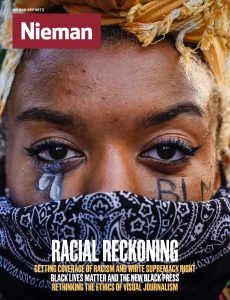
The Impact of the Coronavirus on Journalism
Spring 2020
Without a Campaign to Cover, Reporters Shift to Covering the Voting Process Itself
COVID-19 is threatening to extinguish local media — and fueling bold proposals to fund its long-term future
How coverage of the coronavirus in Italy, Spain, France, and Germany has impacted trust in news outlets
Three Ways To Counter Authoritarian Overreach During the Coronavirus Pandemic
Speculative Journalism can help audiences think about the future, but critics question if integrating science fiction into journalism is responsible
COVID-19, Kentucky Governor Andy Beshear, and the Future of Local News
Lessons from coronavirus coverage for the next health crisis story—climate change
Journalism and Prediction during the Coronavirus Pandemic
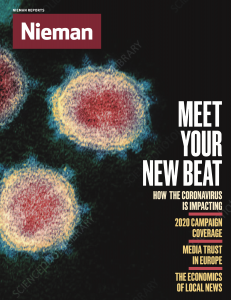
The Hong Kong Protests are Also a Fight for a Free Press
October 10, 2019
Faced with new levels of political pressure and physical threat, Hong Kong’s independent news outlets respond with intrepid reporting and innovative fundraising
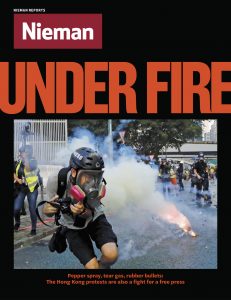
Amidst Crackdowns, Kashmiri Journalists Struggle to Report
August 30, 2019
With communication restrictions creating dueling narratives of what's happening, Kashmiri journalists are fighting to keep people informed
How Implicit Bias Works in Journalism
November 13, 2018
Avoiding the pitfalls of hidden biases can lead to better story selection and more inclusive reporting
The Nieman 80
October, 2018
On the 80th anniversary of the Nieman Foundation, Nieman Fellows reflect on the journalism that’s left an indelible mark on them and their careers
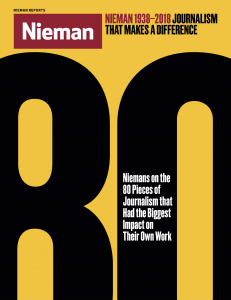
"What Ever Happened to the Free Press?”
August 16, 2018
The Nieman Foundation is joining more than 300 news outlets publishing editorials on Aug. 16 in support of freedom of the press, an effort initiated by The Boston Globe
Critics and Online Outlets Leading the Vanguard in Arts Writing
May 2018
From heady journals to Tumblr manifestos, innovation in art criticism is happening outside the mainstream
Reinventing Local TV News
April 2018
To attract young viewers, stations are going digital-first, crowdsourcing reporting, experimenting with augmented reality, and injecting more personality into the news
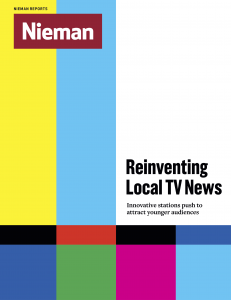
The Race Beat, Revisited
January 2018
At a time when political and social divisions over race are constantly in the headlines, news outlets are striving to cover the issue with accuracy and sensitivity
"Almost Everyone, On Every Beat, Becomes an Immigration Reporter at Some Point"
December 2017
Covering immigration requires a multidisciplinary approach to reporting, from economics to politics to education
#NowWhat
Fall 2017
How newsroom leaders can create workplaces that truly support women
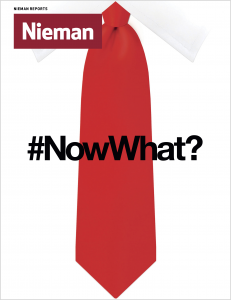
Covering Climate Change, with Urgency and Creativity
August 2017
A look at news outlets bringing innovation, urgency and new audiences to stories on climate change
"A mass shooting, only in slow motion"
June 2017
Newsrooms are moving away from a focus on mass shootings to tell more nuanced stories about the people and communities marred by gun violence
For this piece, Glenn Jeffers won a SPJ Sigma Delta Chi Award for magazine writing.
Where Are the Mothers?
Summer 2017
If news organizations want to attract and retain millennial journalists, it's essential that they work to better meet the needs of parents and create better work-life balance for all employees
What Journalists Must Do Next:
Reporting in the Age of Trump
Fall 2016
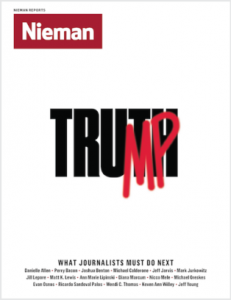
Automation in the Newsroom
Summer 2015
How algorithms are helping reporters expand coverage, engage audiences, and respond to breaking news
Race and Reporting
Spring 2015
The case for more inclusive newsrooms
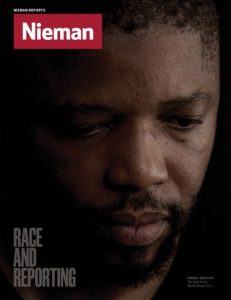
Where Are the Women?
Summer 2014
Why we need more female newsroom leaders
The State of Journalism in China
Winter 2014
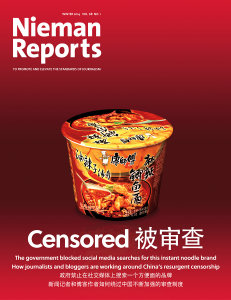
Nieman's 75th Anniversary
Summer-Fall 2013
Organize the Noise: Tweeting Live from the Boston Manhunt
Spring 2013
A reporter and a programmer on what social media coverage of the Boston bombings means for journalism
Related Forum
The Nieman Foundation
May 1, 2013
Shortly after the Boston Marathon bombings, the Nieman Foundation convened a round table conversation on the role of Twitter during coverage. Speakers included Boston Globe deputy managing editor for local news Jennifer Peter; Globe reporter and 2013 Nieman Fellow David Abel; Cheryl Fiandaca, chief of public information for the Boston Police Department; Seth Mnookin, co-director of MIT's Graduate Program in Science Writing; Callie Crossley, host of WGBH's "Under the Radar"; and The Washington Post's director of digital content David Beard. The event was introduced by Nieman Foundation curator Ann Marie Lipinski and moderated by James Geary, Nieman's deputy curator.
The World Weekly
From September through December of 2012, I was the founding editor-in-chief of The World Weekly, a freemium international news magazine combining original journalism with curated content from the best publications around the world. I co-developed the magazine's editorial formula and edited the first three issues. You can read my inaugural editor's letter.

Time Magazine
I worked for TIME from 1993-2006, first as a Netherlands-based stringer, then as a writer, senior editor, founding editor of timeeurope.com, deputy editor and ultimately as Europe Editor, responsible for the European edition of the magazine.
The Other Face of France
November 21, 2005
writer/editor
Can France bring order to the streets and hope to the restive minorities of the banlieues?

Streets of Fire
November 14, 2005
editor
Nights of mayhem scorch France's troubled banlieues and blacken the country's image of itself
The Lost Tribes of Europe
August 29, 2005
writer, cover story
As national borders blur, the Continent's original minorities are fighting to reclaim their ancient cultures and identities

No Way Out
August 8, 2005
editor
After a massive manhunt, Britain's suspected suicide bombers are nabbed. But that doesn't mean the threat of more attacks is over
Don't Mention the War
May 9, 2005
editor
Tony Blair looks set to win what he's said will be his last campaign. But for many, the Iraq war has tarnished his legacy
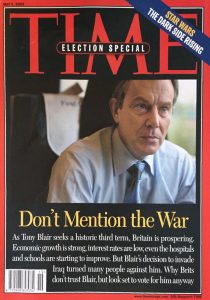
Slaughter of the Innocents
September 13, 2004
senior editor
Inside the Beslan Siege
Everyman's Odyssey
July 5, 2004
writer
James Geary joins a crowd of James Joyce devotees on a Bloomsday trek through Dublin in pursuit of the elusive, allusive soul of Ulysses
A Strike at Europe's Heart
March 22, 2004
senior editor
Inside the Madrid train bombings
Living with Risk
July 28, 2003
writer, cover story
Science can pinpoint potential dangers from GM foods, mobile phones and household chemicals but can't tell us if those risks are real. What's a consumer to do?
This article won the 2004 British Environment and Media Award.

Inside the Moscow Siege
November 4, 2002
senior editor

Interview
BBC World Service
May 17, 2002
News Hour
Patriotic pressure and journalistic self-censorship post-9/11
The Body Electric
March 11, 2002
writer
Scientists are melding computer chips with the human nervous system, allowing people to extend, enhance and repair their senses
Fast Forward Europe
Special Issue, Winter 2000–2001
editor
A Brief History of the Higgs Hunt
November 13, 2000
writer
Scientists in Switzerland may have solved one of the great mysteries of particle physics. Why should we care?
Visions of Europe
Special Issue, Winter 1998–1999
editor
In the Fast Lane
Seven years after regaining independence, Estonia is well on its way to joining the E.U.
Related Interview
MDF1 Direkt
Magdeburg, Germany
May 1999
In the Visions of Europe special issue, Time included Magdeburg, Germany on a map of potential flashpoints for conflict, due to its record of far-right violence. This outraged the mayor, Wilhelm Polte, and many others in the city. Mayor Polte invited me to visit Magdeburg to see for myself. I accepted his invitation and wrote this piece as a result. Mayor Polte neglected to inform me that he had arranged for local news teams to be present at our meeting with residents and officials. So in this segment I am clarifying Time's coverage and explaining that the piece was based on reporting by Time staff and stringers in Germany, not by journalists in New York, which the mayor and others thought was the case. Unfortunately, the German translation of my remarks makes it sound like I was distancing Time from the reporting; I was not. In fact, I was defending the reporting because it was based on local experience and local knowledge from Time journalists in Germany.
The New Age of Discovery
Special Issue, Winter 1997–1998
editor
In the Realm of the Senses
Scientists are using advanced computer technologies to extend, enhance and repair the power of the senses. I later expanded on the research in this article for my first book, The Body Electric.
The Undiscovered Country
Death remains life’s ultimate riddle, but is it inevitable?
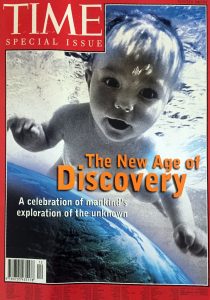
Related Interviews
BBC Wiltshire
February 11, 1998
The Afternoon Show
A Doctor Who-themed, time-traveling tour of some of the issues raised and people featured (including Sir John Maddox about 25 minutes in) in Time's The New Age of Discovery special issue
LBC Radio
December 9, 1997
Drivetime
A conversation about some of the articles from Time's The New Age of Discovery special issue
Hot Air?
October 12, 1998
writer, cover story
Europe’s new left must bring its lofty rhetoric down to earth

Mad About the Noise
July 27, 1998
writer, cover story
Too much noise is driving people mad
Back to Babel
July 7, 1997
writer, cover story
Half the world’s languages are faced with extinction. Does it matter?

Total Recall
May 5, 1997
writer, cover story
Scientists are beginning to grasp how memories are made and stored in the brain. Can "memory drugs" be far behind?
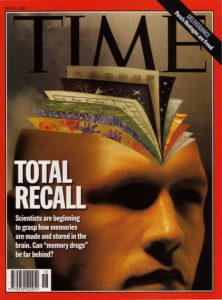
This was my first cover story for Time, and to mark the occasion my son, Gilles, and I were the subject of this issue's editor's letter.
No Stone Unthrown
June 7, 1993
reporter
This is my first appearance in Time magazine. Having traveled to Albania on assignment for another title, I stumbled across the opening of the first privately-owned art gallery in the country since the fall of the Stalinist regime. This piece was based on my reporting of the event, and I received this fax of thanks from the gallery owner after I sent him a copy of the article.
Ode / The Intelligent Optimist
I was editor of Ode / The Intelligent Optimist, a magazine about positive change, from 2006 to 2012. During my tenure, Ode won three gold Eddies and a silver Eddie in the Folio awards and three Maggies in the Western Publishers Association awards.
The Unbearable Lightness of Boredom
July-Aug. 2013
The surprising benefits of being bored
Walking on Water
Jan.-Feb. 2013
One man's odyssey to retrace and reduce his water footprint
True Grit
Nov.-Dec. 2012
How persistence makes us who we are
Sure Enough
July-Aug. 2012
How doubt can lead to greater intimacy, enhanced self- confidence and a deeper sense of spirituality
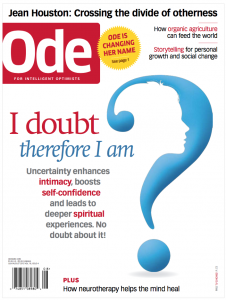
Hidden Persuaders
May-June 2012
Exploring the promise and the perils of the new unconscious
Life Without Leaders
Jan.-Feb. 2012
It's followers who have solutions to our most challenging social and political problems
The Wisdom of One
July-Aug. 2010
How dissent spurs innovation, creativity, and social justice
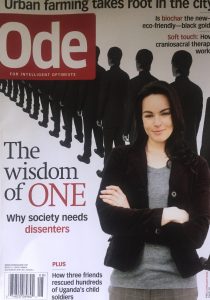
The Joy of Dirt
March 2010
One man's odyssey to retrace and reduce his soil footprint
Why We Laugh
Aug. 2009
A special issue devoted to all things jesting and jocular
I Laugh, Therefore I am
Grins and giggles may hold the key to our social evolution
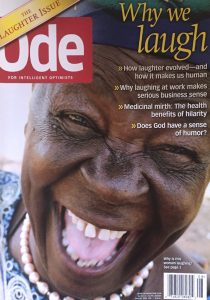
In Praise of Failure
Oct. 2008
Failing is among life's least pleasant experiences, but nothing else is as essential to success
The Silence Issue
July-Aug. 2008
Everything you always wanted to know about peace and quiet
Quiet, Please!
Noise pollution can damage your health and shatter your piece of mind. here's how to turn it down
